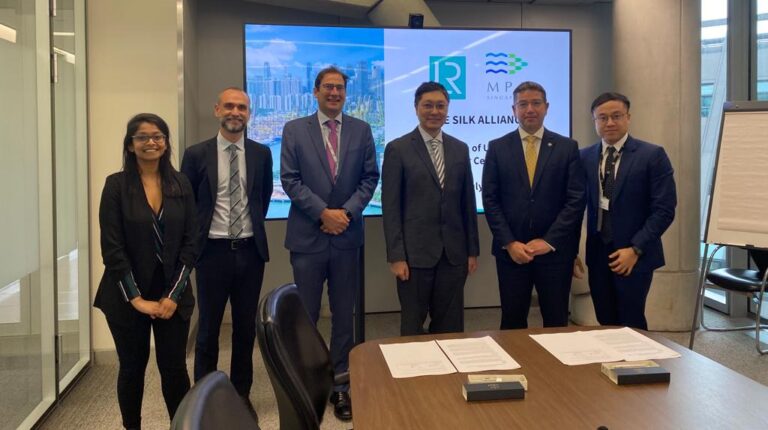A memorandum of understanding has been signed between the Maritime and Port Authority of Singapore (MPA) and Lloyd’s Register Maritime Decarbonisation Hub (LR MDH) to jointly develop a fleet-specific decarbonization strategy and implementation plan for the ‘Silk Alliance’ cross-industry initiative to enable zero-emission shipping across the Indian and Pacific Oceans.
The LR MDH is a collaborative initiative formed between the Lloyd’s Register Group and the Lloyd’s Register Foundation. By sharing skills and knowledge, both parties seek to strengthen their respective commitments to developing partnerships in co-creating the green corridor. The duo also aims to trial decarbonization strategies for container ships operating mostly in Asia to achieve significant emissions impact.
The collaboration will also drive investments into scalable fuel supply infrastructure to meet the demand aggregation signal of members of the Silk Alliance in addition to wider regional bunkering demands for alternative fuel types.
“We’re delighted to welcome the MPA to the expanding Silk Alliance cross-industry collaboration,” commented Nick Brown, chief executive officer, Lloyd’s Register. “Flag and port authorities play a crucial role in increasing the industry’s confidence in zero-emission shipping, and as the world’s largest bunkering hub, we see Singapore and the MPA as a driving force in advancing the safe uptake of low-to-zero-emission fuel in the global shipping industry.”
“MPA is pleased to be part of the Silk Alliance to accelerate the decarbonization of container trade,” said Teo Eng Dih, chief executive of MPA. “The Silk Alliance will enable key stakeholders in Singapore to chart the transition towards low- and zero-carbon options. As the world’s largest transshipment container port and bunkering hub, Singapore will take active steps to support the decarbonization of the container trade in line with IMO’s revised strategy to reduce emissions from shipping.”
The Silk Alliance was first launched in May 2022 and includes 12 cross-supply chain stakeholders. The members include port operator PSA International; shipowners MSC Shipmanagement, Pacific International Lines (PIL), Wan Hai Lines, X-Press Feeders and Yang Ming Marine Transport; shipyard Seatrium; bunker logistical supplier Singfar International; engine manufacturer Wärtsilä; ship manager Wilhelmsen Ship Management; and financial institutions ING and the Asian Development Bank.
The Silk Alliance was initially focused on a baseline fleet which predominantly bunkers in Singapore and conducts operations across Asia, East Africa, the Middle East, Australia and the Pacific Islands. As the implementation phase continues, it is anticipated that the baseline fleet’s demand will eventually aggregate further to other regional hubs and deep-sea routes, including the Singapore-Rotterdam green and digital shipping corridor.
For more on the industry’s decarbonization efforts, click here.



